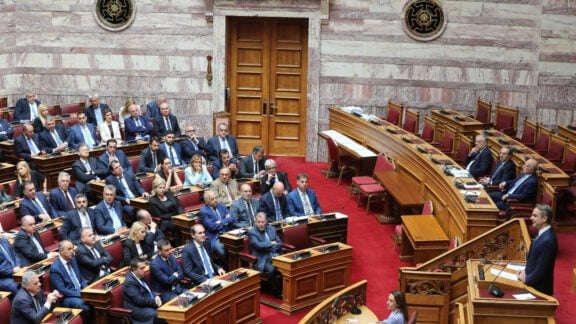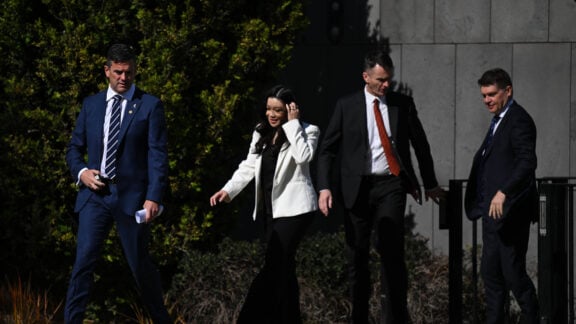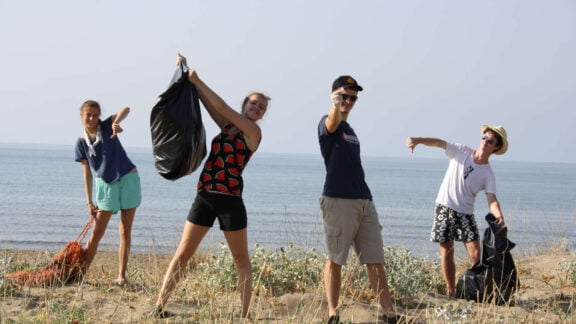A hundred days into Donald Trump’s second term, a trimester had already gestated deepened narratives of degeneration on a global scale. At the same time, dictionary algorithms reminded us of the surplus value of a word increasingly used across the political spectrum as a tool of argumentation in public debate: “weird.” Minnesota Governor Tim Walz had used the adjective “weird” on live television last summer to describe an attribute of Trump’s supremacist agenda. The remark quickly went viral on social media and, soon after, became the cornerstone of the Democrats’ 2024 electoral campaign.
Despite MAGA efforts to appropriate and distort the term, particularly in response to Vice President Harris’s discussion of climate anxiety, “weird” persisted as a synonym for subversion, and as a common denominator for collective crises of all kinds.
The birth of ‘weird: Crisis and global attention
Interestingly, more than a decade ago, the very same word alluded to another narrative of emergency through a radically different trajectory – one that connected the Greek sovereign debt crisis with the country’s main export cultural product in the years of recession. ‘Weird’ became an umbrella term defining the New Wave of Greek Cinema that was demarcated by a series of feature films that were lauded in the international festival circuit, received important awards and distinctions, and even enjoyed commercial distribution in non-Greek territories. Among the most notable of these were Yorgos Lanthimos’ breakout feature Dogtooth [2009] and his 2011 film Alps [2011]; Attenberg [2010] by Athena Rachel Tsangari; Homeland [2010] by Syllas Tzoumerkas; L [2012] by Babis Makridis, and The Eternal Return of Antonis Paraskevas [2013] by Elina Psykou.
Spanning approximately ten years, covering the distance between the announcement of the state’s bankruptcy and the implementation of austerity measures to the end of the third bailout program in 2018, this wave of contemporary Greek filmmaking seemed to cohere and gain international appeal almost overnight. Thanks to the global film industry’s insatiable craving for ‘new blood’, this cycle of weird Greek films became a success story in its own right – one with the potential to counteract the misconception and stereotypes around the ‘failed state’ and the ‘lazy Greeks,’ as well as to feed a collective romantic imaginary about the Greek state all too reminiscent of a contemporary iteration of Philhellenism.
Weird wave, Crisis: Greece, cinema, and the politics of spectacle
Regarded from its outset as a genre with distinct character, the “Greek Weird Wave” quickly developed recognisable aesthetic traits that were charged with a heightened symbolic gravitas: the choice of deadpan, almost robotic performances of the actors; the films’ suggestive and ambiguous dialogue that register as both tragic and comical; the use of neutral settings (predominantly in built environments); highly stylised and symmetrical compositions and slow, static cinematography were invested with the connotations of social isolation, political dysphoria, and civil disobedience. Perhaps unsurprisingly, viewers around the Western world tended to interpret the films as metaphors for the country’s turmoil, not without a soft spot for sensationalism, overgeneralization, and voyeurism. In the words of Steve Rose, the journalist who coined the term “Weird Wave” in a 2011 article in The Guardian: “Is it just coincidence that the world’s most messed-up country is making the world’s most messed-up cinema?” Was it just a coincidence that the world’s reluctance to assess the Greek crisis in its full complexity (and geopolitical dimensions) found an outlet in the register of cinema – the artform commonly described as a “universal language”?
‘Weird’ became an umbrella term defining the New Wave of Greek Cinema that was demarcated by a series of feature films that were lauded in the international festival circuit, received important awards and distinctions, and even enjoyed commercial distribution in non-Greek territories.
This cultural development found the Greek film community torn between two opposing poles. Many artists quietly appropriate aspects of the new “weird” for visibility; often, more established filmmakers discarded it, considering it an artificial label of exoticism, a stigma turned into a brand of provincialism, a variation of the “bon pour l’Orient” determination. Meanwhile, in a (not so) parallel universe, the influential contemporary art exhibition documenta decided to relocate its 14th edition from its home base of Kassel, for the first time, and to hold the 2017 exhibition both in Greece and in Germany, sealing the mandate of “learning from Athens,” and thus establishing the crisis as an enlightening experience – or at least critical turning point (i.e. “Krisis”).
Cultural extraction: From festivals to gentrification
Building on the loaded binary of Germany/Greece, this year-long event not only put into discussion the distribution of intangible, artistic resources between the European centre and its periphery, but also transformed the urban landscape of the Greek capital. This renewed international attention helped to foster a specific mythology (and therefore aesthetics) of Greek degeneration, pushing entire neighbourhoods into deep processes of gentrification to accommodate a certain kind of ‘alternative’ tourism and myriad digital nomads. At a time when the phenomenon of “brain drain” reached its peak, with thousands of highly educated younger-generation Greeks migrating to Europe in search of better living conditions, the wave of artistic/intellectual activity within the borders couldn’t help but raise a burning question: Could Greek “weirdness” being exploited through a process of cultural extractivism? And if so, how did the new value of this cultural resource impact Greek filmmakers and artists who are competing for recognition and market share in global circuits?
Although the label “Greek Weird Wave” seems already obsolete, many contemporary Greek films continue to signal their “weird” pedigree even as they explore extractivist processes through their narratives. Georgis Grigorakis’ 2020 debut feature Digger, for instance, takes us deep into the forests of Northern Greece where an aging farmer named Nikitas (Vangelis Mourikis) is battling a mining corporation that is seeking to acquire his mountainside home. His brusque demeanour marks Nikitas as a “weird” protagonist whose austere and solitary way of life has led, as we learn, to the breakdown of his family. But Nikitas’ “weirdness” is also defined by his environmental consciousness, which is pitched against the industrialist force of resource extraction that is wreaking havoc on the forest’s ecosystem.
Ecological and exploitative realities in contemporary Greek cinema: From Digger to Animal
The relevance to recent developments in Greek society and structured interventions in the natural landscape is both latent and clear: although Digger does not name the area in which its plot is set, contemporary Greek viewers easily draw a connection between its premise and the Skouries project in the peninsula of Halkidiki (an area that is at the same time extremely popular among Balkan tourists), where Canadian company Eldorado Gold operates a gold mine. Whilst the complexity of the local community’s response to this matter is manifested in meticulously choreographed scenes of people dancing, disputing, or fighting in closed environments, it is the camera’s navigation of the landscape that prompts us to recognise the film’s engagement with ecological thinking through a sensory register. The main character’s environmental consciousness is expressed through the film’s contemplative exploration of the forest environment in striking sequences where Giorgos Karvelas’ immersive cinematography seems to conjure the smell of a forest floor after rain. The visual contrast between this dark, fertile place and the dusty wastelands of the nearby quarry is what gives us context for Nikitas’ choice to remain and resist.
More recently, director Sofia Exarchou’s 2023 film Animal (2023) has put a spotlight on exploitative labour conditions that support Greece’s lucrative tourism industry. In the film, actress Dimitra Vlagopoulou plays Kalia – a dancer working her ninth summer as an “animator” creating shows and performing for tourists at an unremarkable Greek island resort. Kalia loves her job, but this year, the unrelenting cycle of rehearsal, performance, and release (through partying) starts to take a physical and emotional toll. Like many of the New Wave films released in the decade after Greece declared bankruptcy, Animal experiments with the effects of repetition, especially about performance and the body. The weird lives of Kalia and the other animators are governed by the rhythms of the entertainment and tourism industries, where no matter what, the show must always go on. But unlike the anti-naturalist performances and sense of repetition that produce a distancing effect in the work of Tsangari or Lanthimos, Exarchou’s film adopts a documentary aesthetic that sets the body in motion as a spectacle or an attraction. It is here, in the labour of the performing body, that the extractivist impulse of the tourism economy becomes visible; throughout the summer, Kalia’s body becomes increasingly bruised and damaged until it has been utterly exhausted.

Beyond the Weird Wave: New films, new frontiers of resistance
Both films, in different ways, stage an affectual encounter with processes of extraction that are usually hidden but sustain our everyday lives. Their deviating “weirdness”, which radiates beyond the conventions of a distinct film genre, prompts us to reconsider the pressures exerted by the extraction of natural resources and human labour. The international appeal of these two films can be indicative of many subtle or larger changes in interconnected ecosystems in the light of more emerging crises: In the landscape of Greek cinema, the popularity of the Weird Wave arguably attracted not only the attention of global audiences, but also incentivised new film co-productions.
European production companies were now more eager to support audiovisual works shot in Greece, with the aid of tax relief schemes such as the 2017 Cash Rebate Greece (CRGR) Program. In the landscape of urban centres and rural periphery, the images of Greece constructed and disseminated by mainstream international hits that rode this wave (The Lost Daughter by Maggie Gyllenhaal [2021], a Netflix distribution, is only one of many examples) gave another boost to practices of over-tourism. As for the natural landscape itself, on the brink of exhaustion due to the vast and ever-increasing number of human visitors who drain its resources for different purposes, its on– or off-screen imagery of degradation leaves less and less room for aesthetization or style.
Exposed to the wave – the ebbs and flows of global instability – the cinematic image of Greece persists in its weirdness: if anything, to help us dig deeper into the complexities of the modern world, and reclaim our myths and narratives of anxiety, exertion, and co-existence.
Dr Alexia Kannas is Senior Lecturer in Cinema Studies at RMIT University and author of Deep Red and Giallo. She curates the ‘Best Films You’ve Never Seen’ series at The Capitol in Melbourne.
Geli Mademli is a PhD candidate at the University of Amsterdam, researching crisis discourses in Greek film. She is the Publications Coordinator at the Thessaloniki Film Festival and a member of the editorial board of Filmicon: Journal of Greek Film Studies.
Land, Legacy & Loss: Contemporary Greek Cinema and Environmental Crisis
At The Capitol on Tuesday, 29 April is part of RMIT’s The Best Films You’ve Never Seen series, this one-night only event features Georgis Grigorakis’s award-winning Digger (2020) and Lia Tsalta’s short The Forest (2018) The films explore the tension between tradition, economic development, and environmental degradation in modern Greece. Presented in partnership with Neos Kosmos, the event brings these cinematic works to Australian audiences and the Greek diaspora.
Digger follows a reclusive farmer facing a mining company and his estranged son in Northern Greece, while The Forest imagines a future devoid of nature.
When: Tuesday, 29 April, 6:30 pm
Where: The Capitol, 113 Swanston Street, Melbourne, VIC
Tickets: https://www.rmit.edu.au/events/2025/april/land-legacy-loss-greek-cinema-and-the-environment









